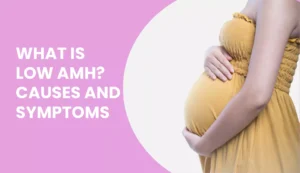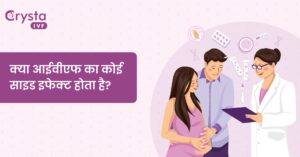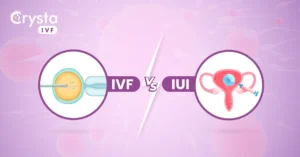Over the past few years, infertility is a condition that has become a common health problem among both males and females. It is usually defined as the inefficiency of conceiving even after trying regular unprotected sexual intercourse.
Countless factors are there causing infertility like unhealthy lifestyle, stress, late childbearing, etc. The initial infertility red flags often revolve around the menstruation nature and sexual intercourse.
Early diagnosis and treatment for the same are very important and hence it is always advisable to visit the best fertility doctors. Fertility isn’t considered imperative until the couple begins to actively begin a family, or in several cases when a couple is facing trouble to conceive. Most people don’t even know that around the age of 22-33 the only chances of conception are around 20-25% with normal reproductive system functionality.
If you intend to become parents and have started your conception journey already without considering the fertility aspects, then here are early red flags of infertility you must pay attention to.
For women
Women experience different infertility signs than men and it is important for them to keep a check on them to alleviate the chances of facing problems in conception. It is also significant to make sure to get in touch with a renowned and experienced fertility doctor.
Here are the red flags for women with which they need to be aware:
Irregular periods
Having periods is completely normal when menstruation begins as the body requires time for regulation. Although, your periods must be regular, once you are through your teenage years. If you have been experiencing irregular cycles, then don’t overlook it as this can signify infertility and can be a symptom of ovulation issues.
You must not delay your visit to the fertility specialist and should consult them so that the right medications or treatment is given before it becomes complex to treat.
Painful periods
How can that be a sign of infertility? Right? Well, it’s true. By painful periods, we don’t here mean cramping that female experiences every month. We are basically talking about the severe pain that averts you from following your regular schedules and even causes problems like vomiting or nausea. However, this alone is not the only red flag of infertility. There are other signs as well painful sexual intercourse, blood in the urine, blood during bowel movements, etc. All these signs can be of endometriosis which is a reproductive condition among women and accounts for around 20-40%.
Age
If you think that conception at any age is effortless, then it’s not like that. Infertility keeps declining with age among both males and females. It is especially for women as when they are above 35 it becomes difficult for them to conceive. However, even if they conceive naturally they have to face the problem of miscarriages.
If we talk about a 30-year-old female, then she has the chances of conception for around 20% but if she is above 35, the chances are only 5%. And in case, if she conceives somehow, chances are that baby will be born with congenital issues. So, it is crucial to be in touch with fertility doctors who can guide you with the right information, and only after diagnosis they can tell you whether there is a need for infertility treatment or not.
PCOS or Polycystic ovarian syndrome
Polycystic ovarian syndrome or PCOS is a health condition among women and causes small cysts forming on the uterus outside, and causes the problem of producing male hormones. When a woman notices any hair growing in uncommon places like the chest, back, arms, and face, then it can be a red flag. On the other hand, hair thinning or loss can be a sign of other infertility-related conditions such as autoimmune disorders, thyroid problems, or anemia.
Sudden unexplained weight gain is also one of the signs one mustn’t ignore. It is important to keep in mind that it plays a vital role when it comes to fertility even if a woman isn’t experiencing the PCOS condition. Being underweight and overweight both lead to causing problems in conception.
Read more: Top Factors Reducing Fertility in Women
For men
Men also need to pay attention to the signs of infertility and must consult the fertility specialist to avoid any complications when trying to achieve conception.
Here are the signs of infertility in men:
Pain or swelling in the testicles
One of the infertility signs in men is testicular swelling and pain which also involve testicular torsion- an infection or a hernia. However, it doesn’t specifically signify that the male has infertility issues but it is always better to consult the infertility specialist.
Sex drive changes
When a man is observing sudden changes in sexual desire, then it is considered as the key indicator of hormonal issues. Inappropriate functioning of a man’s pituitary glands is the usual cause of infertility in males. If there is the consistent use of supplements, steroids then it also disturbs hormones and affects the sex drive and fertility.
Erectile dysfunction
This is linked to hormonal imbalances and is present in couples experiencing the problem of infertility. It can be the outcome of some injury or clinical condition, prescription medications and even psychological factors can be there like stress, anxiety, or depression.
Explore more: Causes of Male Infertility
Final thoughts
If you are planning to have a baby, it’s crucial to be mindful of the factors that can lead to affecting your fertility. This doesn’t mean you get apprehensive about every change in the body. Some infertility red flags are there that you shouldn’t overlook.
Firstly, consult a fertility doctor to understand everything in detail to understand everything in detail.
Secondly, take care of reproductive problems early so that you can enhance the probability of having kids.
Infertility doesn’t indicate that you are sterile or you cannot have babies ever. It is just like any other health problem and most couples have kids sooner or later with the right medical assistance.




